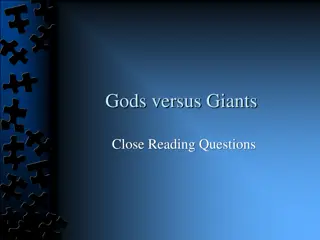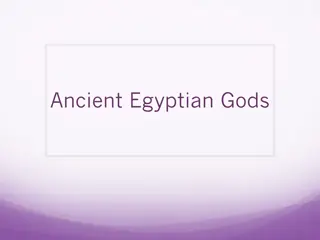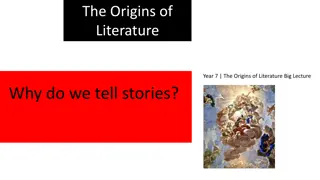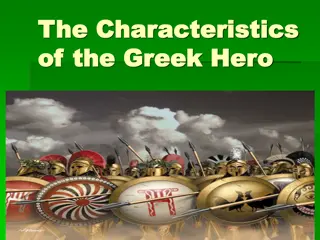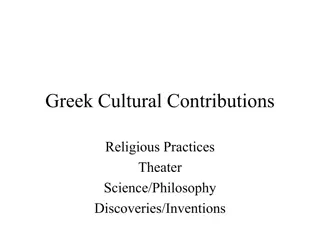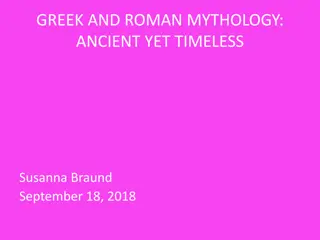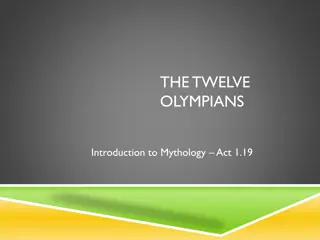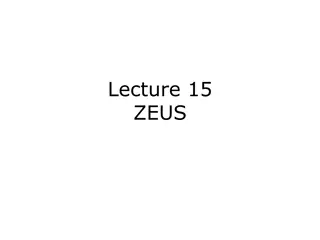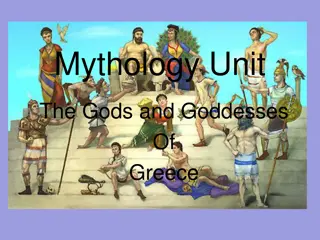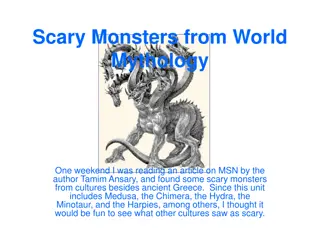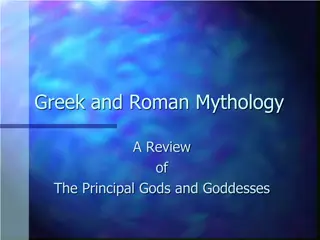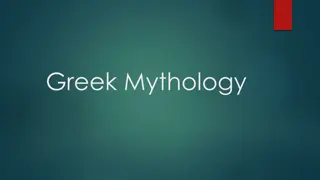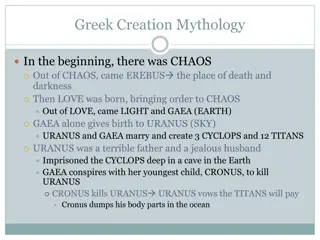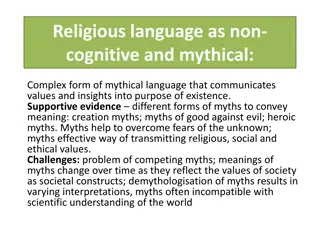Exploring Greek Mythology: Gods, Myths, and Oracles
Explore the fascinating world of Greek mythology, delving into the Greek city-states, culture, and beliefs. Discover the pantheon of Greek gods and goddesses residing on Mount Olympus, the rituals and festivals honoring them, and the significance of oracles in determining one's fate. Unveil the rich tapestry of Greek epics and fables that have shaped ancient beliefs and traditions.
Download Presentation

Please find below an Image/Link to download the presentation.
The content on the website is provided AS IS for your information and personal use only. It may not be sold, licensed, or shared on other websites without obtaining consent from the author. Download presentation by click this link. If you encounter any issues during the download, it is possible that the publisher has removed the file from their server.
E N D
Presentation Transcript
GREECE Chapter 8.
Greek Culture All of the Greek city-states spoke the same language shared the same religious beliefs and customs. Greek Myths expressed the religious beliefs of the ancient Greeks.
Greek Gods Greeks believed in many Gods and Goddesses. They did not think of their Gods as all powerful beings. Their Gods have great powers, but still look and act like human beings. Since they had these attributes, the Greek people did not fear them At times the Gods even act like children and play tricks on each other.
The Greek Gods There were 12 important gods and goddesses that lived on top of Mount Olympus (Greece s highest mountain). A gate of clouds protected them. The Gods could come and go as they pleased, but humans could never enter.
Greek Gods Zeus- King of the Olympian gods. Apollo- God of light. Hermes- Messenger of the gods; god of the marketplace. Hera- Goddess of Marriage Hades- God of the underworld. Aphrodite- Goddess of love and beauty. Poseidon- God of the sea. Athena- Goddess of wisdom; protector of the cities. Hestia- Goddess of the home. Artemis- Goddess of the hunt and animals. Ares- God of war.
Greek Gods To earn favor from the gods, people from Greek city-states would perform rituals. Ritual- An action that is part of a religious ceremony. People worshipped the gods in their homes and temples. They prayed and offered gifts to the gods. They hoped the gods would reward them.
Greek Gods Greeks held festivals honoring the gods and goddesses. They had feasts and animal sacrifices. Every four years, Greek athletes held athletic competitions to honor Zeus. They were held in Olympia and known as the Olympic games. They were held for over 1,000 years. The first modern Olympics were held in 1896.
Greek Oracles Greeks believed that each person had a fate or destiny. They believed that you had no choice in what was going to happen in your life. To find out what was going to happen, Greeks would go to an oracle to prophesize their futures.
Epics and Fables The first Greek stories were epics. They were the Iliad and the Odyssey. Homer wrote both of these poems. (We read the Iliad!!!) The Odyssey tells the story of Odysseus and his long trip home after Troy. He faces storms, monsters, and witches long the way. He eventually makes it home to his wife.
Epics and Fables Greeks believed that these stories as real history. These stories started the idea of heroes. They also taught you how it was important to e loyal to your friends and to value relationships between husband and wife.
Aesops Fables Tales like The Boy Who Cried Wolf and The Tortoise and the Hare , have been credited to a man named Aesop. Aesop probably never actually existed. These fables taught people lessons. They show human weaknesses and strengths. These fables were told at a time known as the Golden Age of Greece . During this time, architecture, art, philosophy, and literature flourished. These stories were told orally- passed down from generation to generation.
Greek Drama A Drama is story told mainly through words and actions of a cast of characters, and is performed by actors. They were performed on stage in Greece. There were two kinds of dramas- Tragedy- the main character struggles to overcome hardships by does not succeed (unhappy ending) and a Comedy The story ends in a happy way.
Greek Poets During the 5thcentury B.C. four writers emerged- Aeschylus, Sophocles, Euripides, and Aristophanes. Aeschylus wrote stories about the Greek king s return from the Trojan War and the troubles his family had. It was a story of revenge and murder. While there is evil leading up to the end- the play ends happily.
Greek Poets Sophocles- Athenian writer Stressed courage and understanding. Wrote Antigone- This play questioned whether or not you should do as ordered, or do what was right.
Greek Poets Euripides Wrote about ordinary human beings in realistic situations. His plays show suffering caused by war. His plays show the suffering caused by war.
Greek Drama Only Greek men could be actors. Aristophanes was the most famous writer of Greek comedies. He made fun of leaders and current issues. Encouraged people to think and laugh. Included lots of jokes that comedy shows use today.
Greek Art and Architecture. Ancient Greeks excelled in arts and architecture. They created works of balance, and harmony. They made beautiful buildings. Each Greek city- state was particularly loyal to a certain god or goddess and made temples for them. The Parthenon was a temple that included a central room that housed statues of the gods.
Lesson 2: The Greek Mind From about 500 B.C. 350B.C. art, architecture, and literature all flourished. Greek philosophers have produced some of the most remarkable ideas the world has ever known. The Greeks created philosophy- which in Greek means love of wisdom . They developed many subjects like history, political science, and biology, and logic, or the study of reasoning.
The Sophists A group of philosophers named Sophists traveled from polis to polis teaching people. They taught math, science, and history. They were best known for their public speaking and debate. They didn t believe that the gods influenced their actions and there wasn t an ABSOLUTE right or wrong. People thought Sophists were just out for money and taught people to win arguments rather than seek truths.
Socrates Socrates was a philosopher in Athens, and he was actually a sculptor by trade. He was a harsh critic of the sophists. He believed in absolute truth and that al real knowledge was within each person. He used The Socratic Method to teach- instead of lecture, he would ask questions to his class and have them answer.
Socrates When Athens was a free society, they allowed free speech. Socrates was allowed to publically question its leaders. When Athens lost the Peloponnesian War, Sparta didn t allow that type of free speech against its government. The new rulers thought Socrates was a dangerous influence and he was sentenced to death. He was given the chance to leave Athens and live, but instead he stayed and drank the poison that was handed out to him. Before he died he said he was living under his cities laws and must obey them.
Plato Plato was a student of Socrates. He became a teacher and founded a school in Athens called an academy. Plato broke society down into three groups in his book The Republic. 1stGroup- Philosopher Kings- ruled with wisdom and justice. 2ndGroup- Warriors- Defended the city. 3rdGroup- Rest of the people- produce food, clothing, and shelter.
Plato Plato believed in a just and reasonable government and openly criticized the Athenian Government. He said that common people could not think for themselves and be easily influenced. He felt that you needed to be well educated and intelligent to lead. He did think women deserved more rights and should have the same opportunities for education and jobs.
Aristotle Aristotle was another great thinker of Greece. He wrote over 200 works on topics such as government, astronomy, and political science. He started a school called the Lyceum. He taught his students the golden mean . This mean is in the middle positions between two extremes. He felt that people should live moderately. He studied stars, plants, and animals and carefully recorded his observations.
Aristotle Aristotle classified living things according to their similarities and differences. He was the first to do this. He also studied government. He wrote a book called Politics, and divided government into 3 parts. Monarchy- rule by one person. Oligarchy- rule by a few people. Democracy- rule by all. He believed the best government had features of all 3. There should be a chief executive to make the final decision. A group of people to form the idea or decision. All of these people should be backed by the people.
Greeks and History No one in any other civilization had bothered to write down truthful events in chronological order. A Greek historian, Herodotus, was the first to document the Persian Wars. He did write that the gods played an important role in the war, but he made a great effort separate fact from fiction. He interviewed people and checked how reliable that source was. Because of his extensive research, Herodotus became known as the father of history.
Greeks and History Another great Greek historian was Thucydides. He was a general in the Peloponnesian War. Unlike Herodotus, he rejected the idea that the gods affected the outcome of the war. He was like a modern reporter. He visited battle sites and interviewed many people. He didn t just state facts. He investigated the cause and effect of major events.
Greek Scientists Ancient Greeks developed many scientific ideas, and have influenced scientific thinking for centuries. In ancient civilizations before Greece, people believed that everything that happened them was a result of some form of a god. The Greeks thought differently. They believed there was a logical and reasonable explanation. Greek scientists didn t have telescopes or microscopes. They made all of their findings through thought and reasoning.
Ancient Greek Medicine Greek scientist, Hippocrates was a physician in ancient Greece who is regarded as the father or medicine . He believed that disease came from natural causes. Before this, people thought there were evil spirits in you. He travelled all over Greece helping the sick. He created the Hippocratic Oath. These are rules that doctors should use their skills to help patients. Doctors today still take this oath.
Lesson 3: Alexanders Empire In the 300 s, the Macedonian's conquered the Greek city states. The Macedonians were farmers who raised sheep and horses. They were a weak civilization until King Phillip II came to power. Phillip lived in Greece when he was younger. He admired the Greeks. When he came to power in Macedonia, he created a strong army. He invaded after the Peloponnesian War, when the city states were weak and conquered them all. He conquered each city-state one by one. He defeated some in battle and others he had bribed the leaders.
Phillip II Athenians warned that Phillip II was a threat to Greek freedom. They tried to get the city-states to unite to fight the Macedonians, but it was too late. Phillips army crushed the divided city-states. Phillip now ruled over almost all of Greece. After conquering Greece, Phillip united Greece and the Macedonians to conquer Persia. Before Phillip could carry out his plans, he died. His son Alexander was now king.
Alexander Takes Over Alexander was 20 years old when he came to power. Alexander was a commander in the Macedonian army at the age of 16. He quickly won respect of his soldiers. They admired him for his bravery and his military skill. Alexander was set to fulfill his father s dream- conquer the mighty Persian Empire.
War with Persia Alexander marched his 40,000 man army into Asia Minor. He led his cavalry (soldiers on horseback) and crushed Persian forces. They then freed Greek city- states that were under Persian control. A year and a half later Alexander defeated the Persians again at Issus. The Persian King Darius III was forced to flee.
War with Persia Alexander headed south to Egypt and built a new city, and named it Alexandria. It was a center of business and trade. It became one of the most important cities in the ancient world. He then headed up north to Mesopotamia, which was now ruled by the Persians. They met near the Tigris River and Alexander s forces defeated them again for the final time.
War with Persia After defeating the Persians, Alexander did not stop. He went over to northwest India. His forces were met with soldiers on elephants. They had never seen this before and were overwhelmed. His soldiers were tired of fighting and Alexander allowed them to go home. On the way home, they travelled through a desert. Thousands of his soldiers died along the way. They finally made it to Babylon. This was a Persian city now under his control. The long journey weighed on his health and he died at the age of 32.
Alexanders Legacy Alexander would ride into battle ahead of his soldiers. His soldiers respected him for his bravery. His role model as a boy was Achilles! His army spread Greek language, ideas, art, and architecture throughout Asia. This led to the Hellenistic Era- A time when Greek Culture spread across Alexander s empire.
Hellenistic Era Alexander wanted to unite all of his conquered people- Greece, Macedonia, Egypt, Mesopotamia, and Persia- but he died too soon. They divided Alexander s empire into 4 different kingdoms. There was a Hellenistic King in each kingdom. They had to speak Greek. The kings created new cities and military posts.
Lesson 4: Hellenistic Culture Alexandria was the capital of the Greek Empire. The world s largest library attracted many scholars. It gained a reputation for learning and economic growth. (Today nearly 4 million people live there). They hired Greek architects to design buildings and architecture to resemble Athens. They spent huge amounts of money for this to happen.
Buildings and Statues Hellenistic Kings lined the streets with Greek temples, theatres, and baths. They created thousands of Greek sculptures and put them all over the empire. For the first time, sculptures started sculpting real life human beings.
Hellenistic Writers Literature was supported by Hellenistic Kings. AS a result, there was a large amount of literature during the Hellenistic Era. Very little has survived today. Plays at this time were mostly stories about love and relationships, as compared with earlier plays that poked fun at political leaders.
Thinkers and Scientists During this time philosophers asked questions like What is a good life? and How can people find peace of mind in a troubled world . Epicurus founded a philosophy known as Epicureanism. This centered around finding happiness and making it the goal of your life. To him it meant spending time with family and friends. He wanted to avoid being worried at all times.
Stoics A Phoenician thinker named Zeno developed a philosophy called Stoicism. This was the philosophy that said you shouldn t feel joy or sadness. They believed if you lived by your emotions you were unhappy. Today the word stoic is used to describe someone who is not feeling happy or sad.
Science and Math Science also flourished during this time. They claimed that the sun was the center of the universe and the earth revolved around it. They found that the Earth was round. They discovered circumference of a circle. They found that the sun was much larger than Earth.
Science and Math They founded the idea of plane geometry- a branch of math centered around measurement and relationships of points, lines, angles, and surfaces of figures. They founded the idea of solid geometry- study of points, lines, angles, surfaces, and solids in 3- dimensional shapes.
Archimedes Archimedes is responsible for Solid Geometry Pi Designed the first catapults. Famous for saying, give me a lever and a place to stand, and I ll move the Earth. He was killed in a bloody fight with the Romans.
Greece and Rome The four Hellenistic Kingdoms did share culture together, but they were unable to work with each other most of the time and eventually went to war with each other. Rome started to conquer lands in the Greek Kingdom one by one. Gradually Rome conquered all of Greece.


